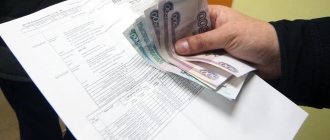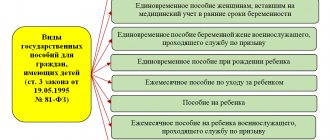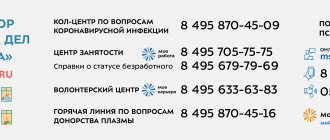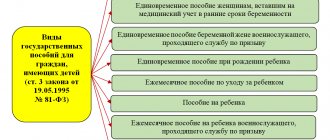What are provided
The legislation of the Russian Federation defines both types of support measures and categories of citizens who can use certain options. An important factor is a person’s place of residence, since some support measures are regulated at the subject level.
At the Federation level, support measures are regulated by the following articles of the Tax Code of the Russian Federation:
- Art. 217 (regarding personal income tax);
- Art. 391 (in part of land);
- Art. 407 (regarding property).
Subjects of the Federation can establish additional provisions, for example, reducing the tax base. You can find out the specifics of regional taxation on the website of the Federal Tax Service, in the “Reference Information” section.
First you need to select the tax you are interested in.
The system will issue a regional regulation establishing tax rates and payment terms.
By clicking on the “Details” button, you will be taken to a page where rates, regional benefits, etc. are indicated.
Which legal entities are entitled to exemption from property tax?
As directly follows from Article 381 of the above-mentioned legislative act, the following organizations (firms, companies) have the right to be exempt from property tax:
- Structures of the penal system.
- Religious organizations registered in the country.
- Companies with at least half of their employees with disabilities, whose total salary share is at least 1/4 of the total payroll.
- All-Russian public organization of disabled people and organizations whose property it owns - subject to the social orientation of their activities and assistance to citizens with disabilities.
- Pharmaceutical manufacturing companies.
All of the above are exempt from paying tax only in relation to property directly used in production or commercial activities.
In accordance with the same article, the following are exempted from the specified tax liability in full:
- Enterprises related to the production of prosthetics and orthopedic products.
- Legal organizations, bar associations and bureaus.
- Companies serving recognized innovative .
As in the previous case, property eligible for the 100% tax benefit must be used exclusively for professional purposes.
Whoever the taxpayer is, a legal entity or an ordinary citizen, in order to receive any tax benefit it is not enough for him to declare his right: he must collect documents confirming it and submit an application to the tax office, and then every year indicate which property should be withdrawn from under tax.
Otherwise, the state will make a decision on its own - and it cannot be argued that it will be optimal from the point of view of the interested citizen or organization.
4 / 5 ( 1 voice )
Who is eligible
Let us consider in more detail which categories of persons may be entitled to what.
| Category name | Options |
| Old age pensioners | Pensioners are exempt:
|
| veteran of labour | Benefits for pensioners:
|
| Citizens who continue to work | Tax benefit for pensioners:
|
| Disabled people of groups 1, 2, 3 |
|
Thus, tax benefits for pensioners on real estate, transport, personal income tax, and other types of them are a significant amount of help for the category of persons under consideration.
Is there an exemption from property tax for individual entrepreneurs and LLCs under special regimes?
Yes, it exists. Among those who are exempt from property tax are organizations and individual entrepreneurs with special regimes. In this case, the following conditions must be met:
| No. | Condition | IP | Organization |
| 1 | The tax regime chosen is | STS, UST, UTII or patent (only for individual entrepreneurs) | |
| 2 | Property in use | As part of business activities | Ownership of the company |
| 3 | Special conditions | There are available documents confirming the use of property in work (lease agreement, agreement with suppliers, payment documents, etc.) | It is on the balance sheet of the enterprise |
However, we note that starting from 01/01/2015, individual entrepreneurs and companies in special regimes must pay tax on the real estate they own for a specific purpose based on its cadastral value (Article 378.2 of the Tax Code of the Russian Federation).
Land tax
Such collection is the authority of local authorities. But at the Federation level, mechanisms have been established that reduce the amount by the cadastral value of their existing land with an area of 600 square meters. m. This means that you do not need to pay for plots of 6 acres or less.
A complete exemption from payment can be established by the authorities of the municipalities of the subject, so information of this kind can be obtained from the local administration.
Article 395 of the Tax Code of the Russian Federation completely exempts from land tax only residents of the North, Siberia, and the Far East, if they belong to the category of small peoples.
Personal income tax
In terms of income received by pensioners, with the exception of the state pension, no benefits are provided. For working pensioners, employers pay personal income tax in the same manner as for other employees.
If a pensioner is engaged in any income-generating activity, then he is obliged to pay personal income tax on time in the amount of 13% of income. The tax is classified as federal, so regional and local authorities cannot in any way influence the fulfillment of this obligation.
This obligation applies to all other types of income, including lottery winnings. Therefore, any income must be taxed. Here, pensioners are treated the same as all other citizens of the Russian Federation. Summary: pensioners pay income tax on income not specified in Art. 217 Tax Code of the Russian Federation.
There are no benefits for individuals, including pensioners. This rule most affects working pensioners, whose taxes are actually paid by the employer. Pensioners pay all federal taxes that apply to individual entrepreneurs and individuals, and specified in Article 13 of the Tax Code of the Russian Federation.
Transport tax
This fee is regional. The Tax Code of the Russian Federation does not contain specific rules for exemption from payments for transport, but there are still some peculiarities.
Transport tax is not paid for:
- agricultural machinery;
- water transport with a power of less than 5 HP. With.;
- cars and motorcycles with a power of less than 100 hp. pp., as well as transport, which serves as a means of rehabilitation for the disabled.
Regional differences exist. Thus, some entities are reducing the rate or completely eliminating the payment of amounts.
This type of support is not available in all regions. The vast majority of areas maintain a tax on cars, regardless of whether a person uses the car throughout the year or seasonally.
What is taxed
First, you need to understand what tax objects will be taken into account when making the corresponding payment. Not all property is taken into account when calculating property taxes.
Among the objects of taxation in this case are:
- rooms;
- apartments;
- Houses;
- dachas;
- garages;
- places for cars;
- immovable single complexes;
- unfinished construction projects;
- structures and structures.
Shares in the specified property are also taken into account. But who has the right not to pay the mentioned tax? Under what circumstances?
Personal income tax
This fee is the main source of income for local budgets, therefore no benefits are provided at the federal level.
However, pension payments are not included in the tax base and, accordingly, are not subject to personal income tax. These are:
- pensions, social benefits;
- the amount of financial assistance from the employer to former employees who went on vacation, for sanatorium treatment, medical care, medications, but in the amount of no more than 4,000 rubles per year
In addition, by purchasing real estate, you can receive a personal income tax deduction. The conditions are the purchase at the expense of the senior citizen and the transfer of the object into his ownership.
Support measures of this type do not apply to real estate properties worth more than 300 million rubles.
You need to understand that if the property is used for profit (for example, renting out an apartment), the person will not receive any relief.
Rules for document preparation
Any citizen of the Russian Federation who is a disabled person of category 1 or 2, from January 1, 2021, in order to receive tax benefits, must submit an application to the tax service for tax benefits and prepare the following package of documents:
- Passport of a citizen of the Russian Federation (you must provide the original document, not a copy);
- A current extract from Rosreestr about the existing property (house, apartment, land and vehicle);
- Certificate confirming the status of a disabled person;
- A medical report with an assigned disability group, containing the results of a medical examination;
- Certificates confirming ownership, purchase and sale agreements.
Let us note that the provision of supporting documentation today is a citizen’s right, not his obligation. The taxpayer can simply indicate the details of documents confirming his right to preferential taxation. Then the tax authority employee himself will send a request to those organizations that issued the documents specified by the taxpayer. After studying them, the applicant will be informed about the results of the consideration of the application. However, there are cases when it is impossible to obtain information, so the tax service may ask the citizen to independently provide the necessary documentation.
Another important point that you need to pay attention to is the ability to recalculate for previous years and return the overpaid amount. The taxpayer has the opportunity to present his right to preferential taxation within three years from the date of its occurrence, and the tax service will recalculate the entire amount of taxes for this period. To get a refund of overpaid taxes, you need to contact the tax authority with a written application. The results of the review will be known in 10 days, the overpaid amount will be refunded within a month from the date of receipt of the application by the tax service.
Benefits for pre-retirees
In the Russian Federation last year, there were lengthy consultations on the issue of supporting people whose retirement age has been raised. As a result, from 2021, Federal Law No. 378-FZ dated October 30, 2018 supplemented paragraph 5 of Article 391 of the Tax Code of the Russian Federation with an important provision that secured tax benefits for the “pre-retirement” category.
Who belongs to the category
The group under consideration includes only those who have 5 years or less left until the period when they will be assigned an old-age insurance pension. This category also includes persons for whom an old-age insurance pension is established on an early basis. In accordance with the new provisions of the law, men retire at 65 years old, women at 60 years old. This means that upon completion of the reform of the pension system, pre-retirees will include men over the age of 60 and women over 55 (if there are grounds for benefits upon retirement, the previously designated age). Thus, people who have less than five years left until retirement are eligible to claim new tax preferences.
In the coming period, while the transition stage continues, the age of the pre-retirement person will constantly change. In the period from 01/01/2019 to 12/31/2023, the pension threshold will be increased by one additional year, which means that the age of inclusion in the group of pre-retirees and the right to receive tax breaks will be adjusted.
Tax benefits for pensioners
According to the Tax Code of the Russian Federation and in connection with the increase in the retirement age, some rules for receiving benefits for pensioners in 2021 have changed.
Now women aged 55 and men aged 60 claim part of the tax benefits. People of these ages and above are divided into two categories: working and non-working pensioners. This affects the receipt of tax benefits. What tax benefits are available to pensioners?
- Land;
- Property;
- Transport;
- When paying court fees and personal income tax;
- Social.
Additional material support for non-working people of retirement age is the indexation of the insurance pension by 6.3%. The social payment is also increased, which is confirmed by the increased monthly payment from February 1, 2021 for all pensioners.
Types of benefits for pensioners
For pensioners, the state has provided a list of taxes for which a person can apply and receive benefits.
Land tax benefits
A pensioner has the right to a tax benefit in the form of a reduction in payment by the cadastral value of 6 acres of land owned by him/her by right of ownership/lifelong ownership. This means that a plot of land within a given area is not subject to taxation - no tax payment is provided. If the area exceeds 6 acres, the tax payment on land will be calculated only in that part that exceeds 6 acres.
A pensioner can claim a tax benefit only for the 1st section.
IMPORTANT!
The right to the plot must be registered directly in the name of the pensioner - only in this case will he be able to claim a tax benefit.
Property tax benefits
A pensioner has the right to receive an exemption from tax payments for:
- apartment;
- House;
- garage;
- parking space;
- outbuilding with an area not exceeding 50 sq.m.
IMPORTANT!
A pre-retirement person can be exempt from tax payments for only one piece of real estate. If a pensioner has two apartments and two garages, the tax exemption will be established for only one apartment and one garage.
Transport tax
Transport tax benefits for pensioners do not apply to federal legislation. Each subject of the Russian Federation, both Moscow and any other, has the right to decide independently whether to provide such a measure of support to pensioners or not. Only the regional legislator decides who, in what amounts in rubles. or percentage and in what order can one claim a benefit for reducing the transport tax rate. In those regions where there is such a benefit for pensioners, it most often amounts to a discount of 50% of the amount of payment required by the pensioner.
Who is exempt from property tax according to regional legislation?
Let's look at examples of property benefits for organizations that operate in the constituent entities of the Russian Federation:
1. Certain categories of taxpayers are exempt from taxation of all owned property.
This benefit is presented in St. Petersburg. Organizations whose main activity is the manufacture of special equipment to support the life and rehabilitation of disabled people are exempt from tax (subclause 1, clause 1, article 4.1 of the St. Petersburg Law “On Organizational Property Tax” dated November 26, 2003 No. 684-96).
In Krasnoyarsk, a similar benefit is provided to organizations engaged in the production of primary aluminum in the region in relation to newly created or acquired property accepted for accounting as fixed assets after 2012 (sub-clause “t”, paragraph 3, article 2 of the law of the Krasnoyarsk Territory “On Tax” on the property of organizations" dated November 8, 2007 No. 3-674).
2. When using property for the intended purpose, it is permissible to use benefits.
For example, Moscow adopted the Law “On Organizational Property Tax” dated November 5, 2003 No. 64, which exempts public railway transport organizations from paying property tax in relation to movable and immovable property used for transportation along the Small Ring of the Moscow Railway (sub. 28 paragraph 1 article 4). The list of such property is established by the Moscow government.
3. Taxpayers are exempt from taxation in relation to a certain type of property.
This benefit, for example, was introduced for property used to carry out activities to organize recreation and health improvement for children under 18 years of age in the Leningrad Region (subparagraph “e”, paragraph 1, Article 3_1 of the Law of the Leningrad Region “On Organizational Property Tax” dated November 25. 2003 No. 98-oz) and the Khabarovsk Territory (clause 12 of Article 3 of the Law of the Khabarovsk Territory “On regional taxes and tax benefits...” dated November 10, 2005 No. 308). In the latter case, it is applicable provided that in other periods the property falling under it is under conservation.
In the Vladimir region, a benefit has been established for public roads of regional and intermunicipal importance (clause 2 of article 2.1 of the law of the Vladimir region “On the property tax of organizations” dated November 12, 2003 No. 110-OZ).
4. Certain categories of taxpayers have the right to a reduction in the amount of tax.
Examples include:
- Moscow region, where organizations that are members of religious associations are allowed to pay 50% of the calculated tax amount (clause 2 of article 14 of the law of the Moscow region “On preferential taxation...” dated November 24, 2004 No. 151/2004-OZ);
- Chelyabinsk region in terms of charitable activities. The amount of the benefit is also 50% (Clause 2, Article 3 of the Law of the Chelyabinsk Region “On Organizational Property Tax” dated November 27, 2003 No. 189-ZO).
In accordance with the Tax Code, in the constituent entities of the Russian Federation it is permissible to use reduced property tax rates (clause 2 of Article 372, clause 2 of Article 380 of the Tax Code of the Russian Federation). However, the reduced rate cannot be considered a benefit.
The use of tax benefits is the right of the taxpayer, therefore it is necessary to have undeniable grounds for the use of this right. Tax authorities may request from the taxpayer supporting and supporting documents for the application of property benefits (Articles 88, 89, 93 of the Tax Code of the Russian Federation).
To find out whether documents will be requested when applying reduced rates, read the material “A differentiated tax rate is not a benefit.”
TIP from “ConsultantPlus” In 2021, additional benefits can be received by property owners who have provided tenants with a deferment in the payment of rental payments in accordance with the Requirements approved by Decree of the Government of the Russian Federation dated 04/03/2020 N 439. The benefits consist of... (for more details, see K+) .
How to apply
The answer to the question of how to apply for a tax benefit for a pensioner is as follows:
- contact your local Federal Tax Service office in person;
- send a set of documents by mail to the address of the local Federal Tax Service in the form of a registered letter;
- submit an application through the Federal Tax Service website;
- through your employer.
Documents you will need:
- Russian passport;
- certificate confirming status;
- TIN;
- documents on the ownership of the property for which a person claims a deduction.
Thus, the legislator, both at the Federation level and at the local level, has provided a number of concessions in the form of tax breaks for pensioners, while increasing the degree of their social protection.
Deadline
When can a citizen demand exemption from mandatory payments for property? Anytime. A person who has grounds for applying for benefits can apply for them to the Federal Tax Service when he deems it necessary. As already mentioned, tax exemption is indicative in nature.
However, there are still some limitations you need to keep in mind. To receive benefits this year, you must contact the Federal Tax Service with a request before November 1. Then the tax authorities will immediately begin to implement the rights entitled to the citizen - they will provide either full or partial tax exemption. Otherwise, changes will begin next year.
The legislative framework
According to Law No. 181, a disability group is assigned based on the results of a medical expert examination. The basis for providing tax benefits for people with disabilities is the Federal Law “On Social Support for Persons with Disabilities”.
The list of real estate tax benefits for persons with disabilities is contained in the Tax Code of the Russian Federation in Part 2 of Article 399 and Article 407:
- Federal Law regulations that relate to the payment of taxes for certain groups;
- Preferential property tax rates for citizens with disabilities;
- Benefits determined by local governments for people with disabilities.
Persons with 1st and 2nd disability groups do not have to pay property tax.











